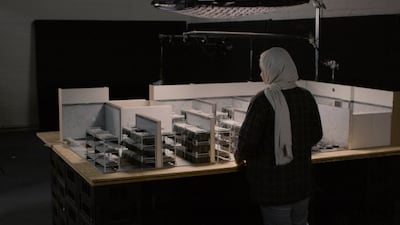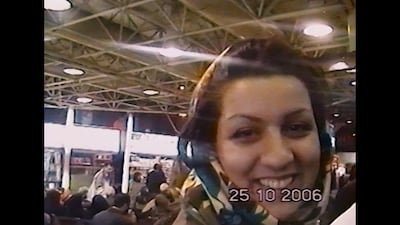Some tragedies happen in an instant. The worst kinds are slow and agonising, as the world watches on, unable to stop a grave injustice from happening. Ten years ago this October, the execution of Reyhaneh Jabbari in Iran fell into the latter category.
For seven long years, thousands across the world joined the efforts of her family to spare the young interior decorator. The UN, Amnesty International and the EU all lobbied for her life. A global petition with 20,000 signatures managed to delay the date by six months, but in the end the efforts were to no avail.
A decade later, Jabbari’s story has been told, with the help of her family and Jabbari herself. The documentary Seven Winters in Tehran, directed by the German filmmaker Steff Niederzoll and screening now at Dubai’s Cinema Akil, recounts the Kafkaesque tale with startling clarity and at times shocking insight, even if you are familiar with her story.
Early on in the film, we hear what happened from Jabbari herself, “with a rope hanging in front of my eyes that I am not afraid of”, she says.

The Iranian actress Zar Amir Ebrahimi, known for the 2022 hit Holy Spider directed by Ali Abbasi, reads a letter from Jabbari written from prison:
“On a spring day in 2007, I was in an ice cream shop. Talking on the phone to a client, for whom I designed a booth at an international fair. When my call was over, a middle-aged man, who was sitting with a friend, approached me.
“He said: ’I overheard your conversation and noticed you’re an interior designer. I have a place that I’d like to convert into a clinic. I’m a plastic surgeon.”
According to the defence’s account, she went to the place with the 47-year-old man, Morteza Abdolali Sarbandi. While there, he attempted to sexually assault her. She stabbed the man in self-defence with a pocket knife, fleeing the scene as he bled to death.
What followed was a travesty. According to the documentary, after being held in solitary confinement for months after arrest, Jabbari was manipulated into giving false confessions that it was premeditated, with her sister’s life threatened if she did not comply. Evidence was destroyed. Even when the system began to work in her favour when a judge proved sympathetic, he was quickly replaced by another to undo the progress her team had made.
As we learn in the film through interviews with her surviving family, the inmates who were held in captivity by her side, and through other footage and documents that were smuggled out of Iran, those years between her arrest and her execution were harrowing, exposing the systemic bias against women in the country.

In one of the film’s most eye-opening moments, we learn from Jabbari through the voice of Ebrahimi that the replacement judge told her she should have simply allowed herself to be sexually assaulted.
But as excruciating as it is to watch Jabbari’s story unfold, it is not entirely hopeless. The seven years were a testament to her resilience and defiance. And her indefatigable spirit is shared with women across Iran, as they have continued to resist their oppression in the years since, as stories very similar to Jabbari’s have played out again and again.
While Jabbari’s efforts against the system were unsuccessful, her story is not without hope. Even facing her inevitable demise, Jabbari did not lose faith in the women of Iran to secure a better future, even if she knew her own life wouldn’t be spared.
As she said in a letter to her mother, read in the film: “I have learnt that sometimes you have to fight. I realised that even in harsh conditions, a spark can create some happiness and positivity.”

